
漢德百科全書 | 汉德百科全书




 Aserbaidschan
Aserbaidschan
 Bahrain
Bahrain

 Geschichte
Geschichte
 K 500 - 1000 nach Christus
K 500 - 1000 nach Christus
 Irak
Irak
 Iran
Iran
 Jemen
Jemen
 Kuwait
Kuwait
 Libanon
Libanon

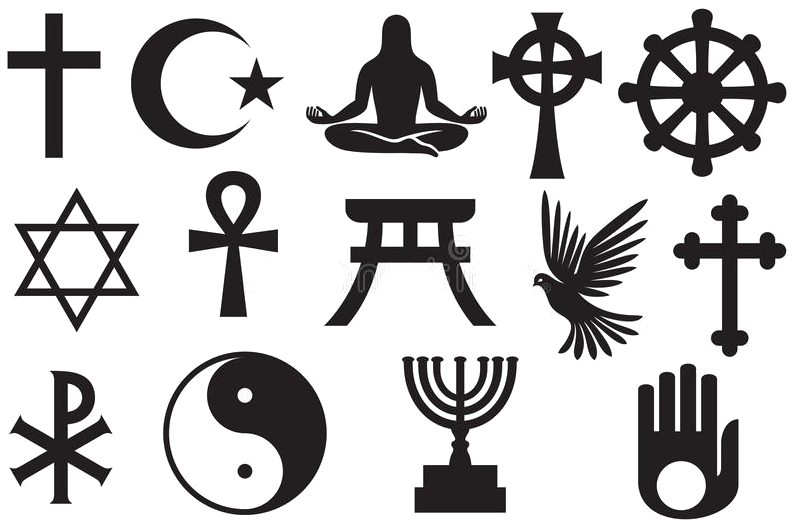 Religion
Religion
 Islam
Islam
 Syrien
Syrien
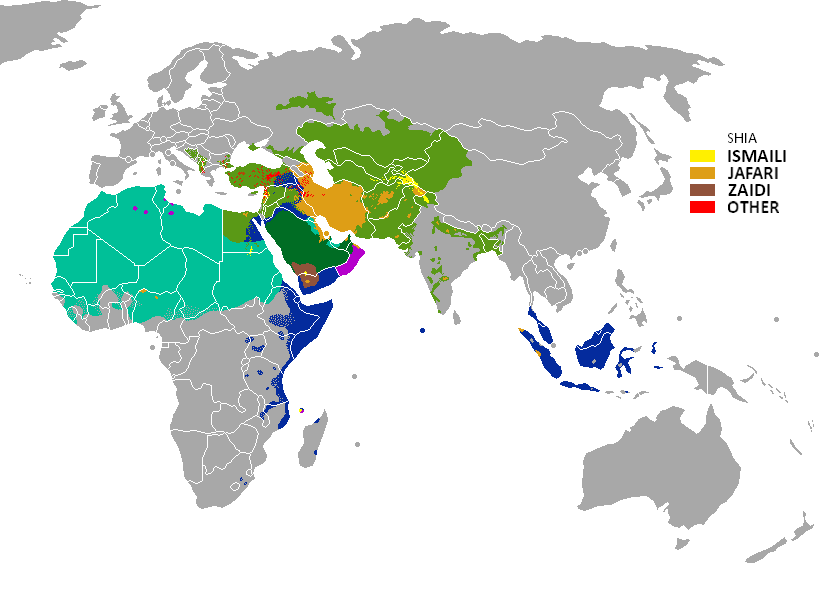
Die Schia (arabisch الشيعة asch-schīʿa, DMG aš-šīʿa ‚Anhängerschaft, Partei, Gruppe‘), im Deutschen auch Schiitentum oder Schiismus genannt, ist nach dem Sunnitentum die zweitgrößte religiöse Strömung innerhalb des Islams. Heute wird der Begriff häufig in verallgemeinernder Weise für die Zwölferschia verwendet, die die zahlenmäßig größte Gruppe innerhalb der Schia darstellt, allerdings umfasst die Schia noch zahlreiche andere Gruppierungen.
什叶派(阿拉伯语:شيعة,Shīʿah,英语:Shia,/ˈʃiːə/),来自阿拉伯语:شيعة علي(Shīʻatu ʻAlī,Shia-ne-Ali)的缩写,原意为阿里的追随者,与逊尼派并列为伊斯兰教的两大主要教派之一。什叶派与逊尼派各门派中的主要不同不在于教义问题,主要在于谁是穆罕默德“真正接班人”。在历史上曾出现过“穆阿维耶什叶”、“奥斯曼什叶”和“阿里什叶”等,目前则专指认为穆罕默德的继任者是阿里·本·阿比·塔利卜(穆罕默德堂弟及女婿)的人,逊尼派则认为穆罕默德的继任者是他的岳父阿布·伯克尔。
シーア派(アラビア語:الشيعة、ラテン文字転写:ash-Shīʻa(h))は、イスラム教の二大宗派の一つで、2番目の勢力を持つ。最大勢力であるもう一方はスンナ派(スンニ派)である。
7世紀のカリフであったアリー[1]とその子孫のみが、預言者の代理たる資格を持ち、「イスラム共同体(ウンマ))」の「指導者(イマーム)」の職務を後継する権利を持つと主張する。
Shia Islam or Shi'ism is one of the two main branches of Islam. It holds that the Islamic prophet Muhammad designated Ali ibn Abi Talib as his successor and the Imam (leader) after him,[1] most notably at the event of Ghadir Khumm, but was prevented from the caliphate as a result of the incident of Saqifah. This view primarily contrasts with that of Sunni Islam, whose adherents believe that Muhammad did not appoint a successor and consider Abu Bakr, who was appointed caliph by a group of Muslims at Saqifah, to be the first rightful caliph after Muhammad.[2] A person observing Shia Islam is called a Shi'ite.
Shia Islam is based on Muhammad's hadith (Ghadir Khumm).[3][4] Shia consider Ali to have been divinely appointed as the successor to Muhammad, and as the first Imam. The Shia also extend this Imammah to Muhammad's family, the Ahl al-Bayt ("the people/family of the House"),[5] and some individuals among his descendants, known as Imams, who they believe possess special spiritual and political authority over the community, infallibility and other divinely ordained traits.[6] Although there are many Shia subsects, modern Shia Islam has been divided into two main groupings: Twelvers and Ismailis, with Twelver Shia being the largest and most influential group among Shia.[7][8][9]
Il regroupe environ 10 à 15 % des musulmans. La première communauté chiite vit en Iran, où elle constitue 90 % de la population du pays, et environ 40 % de la population chiite mondiale2,3,4. Le reste des musulmans chiites se répartit principalement en Irak, en Azerbaïdjan, au Pakistan, en Inde, à Bahreïn et au Liban.
L’Islam sciita (in arabo: شيعة, shiʿa «partito, fazione», sottinteso «di ʿAli e dei suoi discendenti») è il principale ramo minoritario dell'Islam (intorno al 15% ai primi del XXI secolo).
Se da un lato essa presenta la maggioranza della popolazione in Iran, Iraq, Azerbaigian e Bahrein, dall'altro in Libano e in Yemen essa costituisce una forte e significativa minoranza, con quasi un terzo della popolazione di fede sciita.
In Egitto invece, in Siria, in Turchia, in Afghanistan, in India, in Qatar, in Kuwait, in Pakistan, nell'Asia Centrale ex-sovietica, nell'Africa islamica a sud del Sahara, lo sciismo vanta percentuali assai minori (tra il 5% e il 10%), come è il caso della stessa Arabia Saudita, col suo scarso 4-5% all'incirca. Anche all'interno dello sciismo (come nel sunnismo e nel kharigismo) ci sono i sufi e coloro che rifiutano l'approccio sufico considerato troppo libero.
El chiismo o islam chií (o chía, en árabe, شيعة (šīʿa)) constituye una de las principales ramas del islam junto al sunismo. Es el nombre tradicional por el que se conoce a la escuela de jurisprudencia islámica Ya'farita. El chiismo es profesado por alrededor del 15 % de los 1600 millones de musulmanes existentes en el mundo.2
Шии́ты (араб. شيعة; [шӣ‘а] — приверженцы, последователи) — направление ислама, объединяющее различные общины, признавшие Али ибн Абу Талиба и его потомков единственно законными наследниками и духовными преемниками пророка Мухаммеда[1]. В узком смысле понятие, как правило, означает шиитов-двунадесятников, преобладающее направление в шиизме, которое преимущественно распространено в Иране, Азербайджане, Бахрейне, Ираке и Ливане, а также в Йемене, Афганистане, Турции, Сирии, Кувейте, Пакистане, ОАЭ.

 Algerien
Algerien
 Angola
Angola
 Ecuador
Ecuador

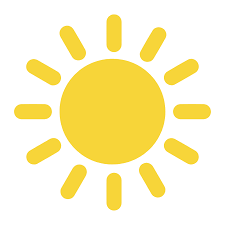 Energieressource
Energieressource

 Finanz
Finanz
 *Brasilien-Konjunkturdaten
*Brasilien-Konjunkturdaten

 Finanz
Finanz
 *China-Konjunkturdaten
*China-Konjunkturdaten

 Finanz
Finanz
 *Deutschland-Konjunkturdaten
*Deutschland-Konjunkturdaten

 Finanz
Finanz
 *Europäische Union-Konjunkturdaten
*Europäische Union-Konjunkturdaten

 Finanz
Finanz
 *Frankreich-Konjunkturdaten
*Frankreich-Konjunkturdaten

 Finanz
Finanz
 *Indien-Konjunkturdaten
*Indien-Konjunkturdaten

 Finanz
Finanz
 *Indonesien-Konjunkturdaten
*Indonesien-Konjunkturdaten

 Finanz
Finanz
 *Italien-Konjunkturdaten
*Italien-Konjunkturdaten

 Finanz
Finanz
 *Japan-Konjunkturdaten
*Japan-Konjunkturdaten

 Finanz
Finanz
 *Kanada-Konjunkturdaten
*Kanada-Konjunkturdaten

 Finanz
Finanz
 *Vereinigte Staaten-Konjunkturdaten
*Vereinigte Staaten-Konjunkturdaten

 Finanz
Finanz
 *Vereinigtes Königreich-Konjunkturdaten
*Vereinigtes Königreich-Konjunkturdaten

 Geographie
Geographie
 *Welt-Übersicht
*Welt-Übersicht

 Hand in Hand
Hand in Hand
 Irak
Irak
 Iran
Iran
 Kuwait
Kuwait
 Libyen
Libyen
 Nigeria
Nigeria
 OPEC
OPEC
 Republik Kongo
Republik Kongo
 Saudi-Arabien
Saudi-Arabien
 Venezuela
Venezuela
 Vereinigte Arabische Emirate
Vereinigte Arabische Emirate

 Wichtige internationale Organisationen
Wichtige internationale Organisationen

Die Organisation erdölexportierender Länder (kurz OPEC, von englisch Organization of the Petroleum Exporting Countries) ist eine 1960 gegründete internationale Organisation mit Sitz in Wien. Derzeit gehören dem Kartell fünfzehn Staaten an: Algerien, Angola, Ecuador, Äquatorialguinea, Gabun, Iran, Irak, die Republik Kongo, Kuwait, Libyen, Nigeria, Katar, Saudi-Arabien, die Vereinigten Arabischen Emirate und Venezuela.[1] Indonesien ist Ende 2016 ausgetreten.
Fünf OPEC-Mitglieder (Saudi-Arabien, Iran, Kuwait, Venezuela, Vereinigte Arabischen Emirate) gehören zu den zehn größten Erdölförderern der Welt. Insgesamt fördern die OPEC-Mitgliedstaaten ungefähr 40 Prozent der weltweiten Erdölproduktion und verfügen über drei Viertel der weltweiten Erdölreserven. Nachdem einige Nicht-OPEC-Staaten ihr Ölfördermaximum überschritten haben, wird erwartet, dass der Einfluss der OPEC steigt. Andererseits stellen manche Experten (z. B. Matthew Simmons) die Angaben zu den Reserven in Frage, etwa die Saudi-Arabiens.
石油输出国组织(英语:Organization of the Petroleum Exporting Countries,OPEC,发音为/ˈoʊpɛk/ OH-pek;简称欧佩克、油盟或油组)是由伊朗、伊拉克、科威特、沙特阿拉伯和委内瑞拉五国为共同应对由英美主导的七姊妹跨国石油公司,并且维护石油这一稳定收入,而于1960年在巴格达成立的一个政府间组织。总部自1965年以来设于奥地利维也纳,截至2018年2月拥有14个成员国。2016年,14个国家估计占全球石油产量的44%,占全球探明石油储量的73%。这使得欧佩克可以对全球原油价格产生重大影响。
石油输出国组织的既定使命是“协调统一成员国的石油政策与价格、确保石油市场的稳定,以确保为石油消费国有效、经济而稳定的石油供应,为产油国提供适度的尊重和稳定的收入,为投资于石油行业的资本提供公平的回报。”[2]该组织也是国际石油市场信息的重要提供者。截至2017年5月,石油输出国组织(欧佩克)的成员除了前加入的五个外还包括阿尔及利亚(1969年加入)、阿拉伯联合酋长国(1967年加入)、安哥拉(2007年加入)、厄瓜多尔(1973年加入,1992年退出,2007年再加入)、赤道几内亚(2017年加入)、加蓬(1975年加入,1995年初退出,2016年再加入)、利比亚(1962年加入)、尼日利亚(1971年加入)、卡塔尔(1961年加入,2019年1月退出)、刚果共和国(2018年加入),而印尼则是其前成员(1962年加入,2008年底退出,2016年1月重新加入,同年12月再度退出)。沙特阿拉伯是该组织事实上的(英语:De facto)领导者。三分之二的石油输出国组织的石油产储量位于围绕富油波斯湾的六个中东国家。
石油輸出国機構(せきゆゆしゅつこくきこう、英: Organization of the Petroleum Exporting Countries、略称:OPEC(日本語発音:オペックopec 、アメリカ英語発音:[ˈoʊpek] オウペク))は、国際石油資本などから石油産出国の利益を守ることを目的として、1960年9月14日に設立された組織である。設立当初は、イラン、イラク、クウェート、サウジアラビア、ベネズエラの5ヶ国を加盟国としていたものの、後に加盟国は増加し、2018年7月現在では15ヶ国が加盟している。世界最大のカルテルとされ、1970年代には石油の価格決定権を国際石油資本より奪い、2度のオイルショックを引き起こしたが、1986年からは石油価格の決定権は自由市場へと移ったこともあり、現在では価格統制力はそれほど強いものではない。なお、オーストリアは加盟国ではないものの、石油輸出国機構の本部は首都ウィーンに設置されている。
The Organization of the Petroleum Exporting Countries (OPEC, /ˈoʊpɛk/ OH-pek) is an intergovernmental organisation of 14 nations, founded in 1960 in Baghdad by the first five members (Iran, Iraq, Kuwait, Saudi Arabia, and Venezuela), and headquartered since 1965 in Vienna, Austria. As of September 2018, the then 15 member countries accounted for an estimated 44 percent of global oil production and 81.5 percent of the world's "proven" oil reserves, giving OPEC a major influence on global oil prices that were previously determined by the so called "Seven Sisters” grouping of multinational oil companies.
The stated mission of the organisation is to "coordinate and unify the petroleum policies of its member countries and ensure the stabilization of oil markets, in order to secure an efficient, economic and regular supply of petroleum to consumers, a steady income to producers, and a fair return on capital for those investing in the petroleum industry."[4] The organization is also a significant provider of information about the international oil market. The current OPEC members are the following: Algeria, Angola, Ecuador, Equatorial Guinea, Gabon, Iran, Iraq, Kuwait, Libya, Nigeria, the Republic of the Congo, Saudi Arabia (the de facto leader), United Arab Emirates, and Venezuela. Indonesia and Qatar are former members.
The formation of OPEC marked a turning point toward national sovereignty over natural resources, and OPEC decisions have come to play a prominent role in the global oil market and international relations. The effect can be particularly strong when wars or civil disorders lead to extended interruptions in supply. In the 1970s, restrictions in oil production led to a dramatic rise in oil prices and in the revenue and wealth of OPEC, with long-lasting and far-reaching consequences for the global economy. In the 1980s, OPEC began setting production targets for its member nations; generally, when the targets are reduced, oil prices increase. This has occurred most recently from the organization's 2008 and 2016 decisions to trim oversupply.
Economists often cite OPEC as a textbook example of a cartel that cooperates to reduce market competition, but one whose consultations are protected by the doctrine of state immunity under international law. In December 2014, "OPEC and the oil men" ranked as #3 on Lloyd's list of "the top 100 most influential people in the shipping industry".[5] However, the influence of OPEC on international trade is periodically challenged by the expansion of non-OPEC energy sources, and by the recurring temptation for individual OPEC countries to exceed production targets and pursue conflicting self-interests.
L'Organisation des pays exportateurs de pétrole (OPEP) (en anglais Organization of Petroleum Exporting Countries (OPEC)), est une organisation intergouvernementale (un cartel) de pays visant à négocier avec les sociétés pétrolières pour tout ce qui touche à la production de pétrole, son prix et les futurs droits de concession1. Depuis le 1er août 2016, le secrétaire général de l'OPEP est l'ancien patron de la compagnie nationale des hydrocarbures du Nigeria (NNPC) Mohammed Barkindo2.
L'Organizzazione dei Paesi esportatori di petrolio, meglio conosciuta come OPEC (Organization of the Petroleum Exporting Countries), fondata nel 1960, comprende dodici Paesi che si sono associati, formando un cartello economico, per negoziare con le compagnie petrolifere aspetti relativi alla produzione di petrolio, prezzi e concessioni. La sede dell'OPEC, dapprima stabilita a Ginevra, a partire dal 1º settembre 1965 è stata trasferita a Vienna.
Gli stati membri OPEC controllano circa il 78% delle riserve mondiali accertate di petrolio, il 50% di quelle di gas naturale e forniscono circa il 42% della produzione mondiale di petrolio ed il 17% di quella di gas naturale.[1] L'organizzazione parallela dell'OAPEC (Organizzazione dei Paesi Arabi Esportatori di Petrolio), fondata nel 1968 nel Kuwait, si occupa del coordinamento delle politiche energetiche dei paesi Arabi che fanno parte dell'OPEC.
La Organización de Países Exportadores de Petróleo (OPEP) es un organismo internacional fundado en Bagdad, Irak, en 1960. Actualmente lo conforman 15 países, de los cuales 5 son miembros fundadores (Arabia Saudita, Kuwait, Irán, Irak y Venezuela). Desde 1965 tiene sede en Viena, Austria. Constituido a iniciativa del Gobierno de Venezuela, presidido por Rómulo Betancourt, y el entonces presidente de Irak, Muhammad Najib ar-Ruba'i, en respuesta a la concentración de poder político y económico de los Estados Unidos como principal productor y consumidor de petróleo del mundo en el período de posguerra.
La OPEP "puede tener una gran influencia en el mercado de petróleo, especialmente si decide reducir o aumentar su nivel de producción".1 El 43% de la producción mundial de petróleo y el 81% de las reservas mundiales de petróleo se encuentran en países miembros de la OPEP.2 Su dominio en las exportaciones de crudo, para el tercer trimestre del año 2016, se sitúa en alrededor del 34,9%.3 Además, concentra la totalidad de la capacidad necesaria de producción de petróleo del mundo, lo que, de facto, convierte a la Organización de países exportadores de petróleo en el banco central del mercado petrolero.
La cuota de mercado de la organización aumentará en el futuro, ya que la Agencia Internacional de la Energía prevé que la producción de petróleo convencional de los países que no forman parte de la OPEP alcanzará su máximo alrededor de 2015.
La OPEP es una organización reconocida desde el 6 de noviembre de 1962 por la Organización de las Naciones Unidas (ONU), gracias a la resolución número 6.363.[cita requerida] La OPEP tuvo su sede en Ginebra (Suiza) entre 1960 y 1965, y después trasladó su sede a Viena, gracias a las facilidades que otorgó el gobierno austríaco.
Los estatutos de la OPEP establecen que su objetivo es coordinar y unificar las políticas petroleras entre los países miembros, con el fin de garantizar unos precios justos y estables para los productores de petróleo, el abastecimiento eficiente, económico y regular de petróleo a los países consumidores y un rendimiento justo del capital de los inversores.
Los países miembros lograron un significativo aumento del precio del petróleo, sobre todo en los años 1973, 1974 y 1979, y una mayor participación y control sobre la explotación realizada en sus territorios.
La OPEP vivió su primera ampliación en 30 años en enero de 2007 cuando Angola se convirtió de forma oficial en el duodécimo socio del grupo, tras pedir su ingreso en la reunión de la OPEP en Abuya (Nigeria) de diciembre de 2006 y haber sondeado al grupo en la reunión de Caracas (Venezuela) de ese mismo año.
A comienzos del año 2007 el gobierno de Ecuador anunció la posibilidad de regresar a la organización,4 hecho que se materializó finalmente en noviembre de ese mismo año.
Posteriormente, Indonesia suspendió su membresía nuevamente en 2016,5 luego de dos años de haber reingresado a la organización, tras su salida en 2008.
Recientemente, Gabón reingresó a la organización en el año 2016, luego de haber suspendido su membresía en el año 1995; mientras que Guinea Ecuatorial se unió por primera vez a la organización en mayo de 2017.6
Catar, uno de los productores de crudo más pequeños dentro de la Organización, ha anunciado su retiro del organismo para enero de 2019. Así lo dio a conocer su ministro de energía, Saad Sherida al-Kaabi, durante una rueda de prensa el lunes 3 de diciembre de 2018.7
Otros países productores de petróleo, aunque no son integrantes de la OPEP, como Sudán, México, Noruega, Rusia, Kazajistán, Omán y Egipto, participan regularmente como observadores en las reuniones ordinarias del grupo.
Организа́ция стран — экспортёров не́фти (англ. The Organization of the Petroleum Exporting Countries; сокращённо ОПЕ́К, англ. OPEC) — международная межправительственная организация, созданная нефтедобывающими странами в целях контроля квот добычи на нефть. Часто рассматривается как картель. В состав ОПЕК входят 15 стран[4]: Алжир, Ангола, Венесуэла, Габон, Иран, Ирак, Конго, Кувейт, Катар (с января 2019 выходит из альянса), Ливия, Объединённые Арабские Эмираты, Нигерия, Саудовская Аравия, Экваториальная Гвинея и Эквадор. Штаб-квартира расположена в Вене. Генеральный секретарь (с 01 августа 2016 г.) — Мохаммед Баркиндо.[5]
Страны члены ОПЕК контролируют около 2/3 мировых запасов нефти. На их долю приходится ~35 % от всемирной добычи или половина мирового экспорта нефти. Доказанные запасы нефти стран, входящих в ОПЕК, в настоящее время составляют 1199,71 миллиарда баррелей.

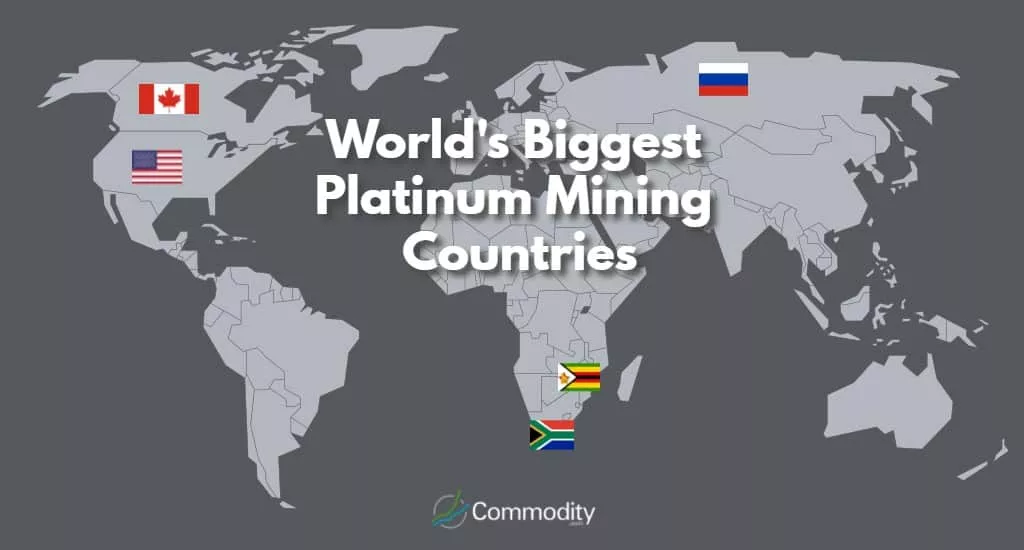
 Argentinien
Argentinien
 China
China

 Essen und Trinken
Essen und Trinken
 *Teesorten,Teeanbaugebiete,Teezeremonie,Teekultur
*Teesorten,Teeanbaugebiete,Teezeremonie,Teekultur
 Indien
Indien
 Indonesien
Indonesien
 Iran
Iran
 Japan
Japan
 Kenia
Kenia
 Sri Lanka
Sri Lanka
 Türkei
Türkei
 Vietnam
Vietnam
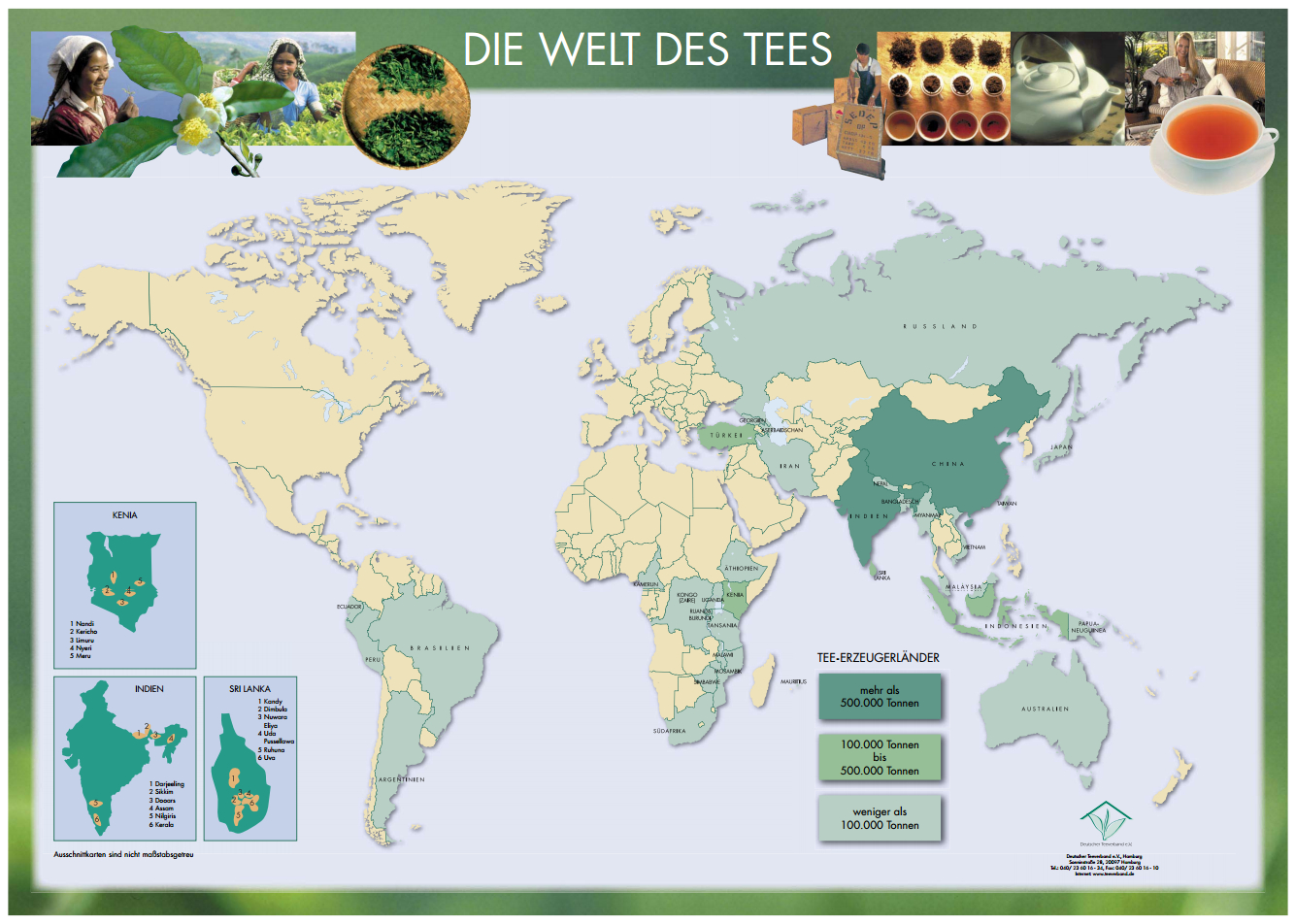



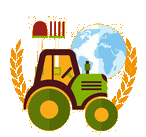 Landwirtschaft, Forstwirtschaft, Viehzucht, Fischerei
Landwirtschaft, Forstwirtschaft, Viehzucht, Fischerei
 Wirtschaft und Handel
Wirtschaft und Handel